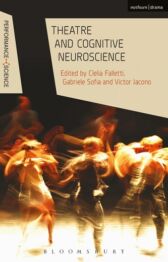Synopsis
Theatre and Cognitive Neuroscience
Clelia Falletti et al - Editor
Published by Methuen
With contributions from neuroscientists, theatre scholars and artists from seven countries, it offers a rich and rigorous array of perspectives as a springboard to further exploration
Divided into four parts, each prefaced by an expert editorial introduction, it examines:
* Theatre as a space of relationships: a neurocognitive perspective
* The spectator's performative experience and 'embodied theatrology'
* The complexity of theatre and human cognition
* Interdisciplinary perspectives on applied performance
Each part includes contributions from international pioneers of interdisciplinarity in theatre scholarship
And from neuroscientists of world-renown researching the physiology of action, the mirror neuron mechanism, action perception, space perception, empathy and inter-subjectivity
While illustrating the remarkable growth of interest in the performing arts for cognitive neuroscience, this volume also reveals the extraordinary richness of exchange and debate born out of different approaches to the topics
TABLE OF CONTENTS
Preface
PART ONE : Theatre as a space of relationships: a neurocognitive approach
1. Editorial Introduction: The space of shared action (Clelia Falletti, Sapienza University of Rome, Italy)
2. "Mirror mechanism" and motor behavior (Maria Alessandra Umiltà, neuroscientist, University of Parma, Italy)
3. Body presence and extra-personal space perception (Giorgia Committeri and Chiara Fini neuroscientists, University of Chieti, Italy)
4. The actor at the circus. Towards a cognitive approach (Philippe Goudard, University Paul Valéry Montpellier 3, France)
PART TWO : The spectator's performative experience and "Embodied theatrology"
5. Editorial introduction: Towards an "Embodied Theatrology"? (Gabriele Sofia, University Paul Valéry Montpellier 3, France)
6. Body and corporeality. A small multidisciplinary glossary (Marco De Marinis, University of Bologna, Italy)
7. Audiences' experience of proximity and co-presence in live dance performance (Corinne Jola, neuroscientist and choreographer, Abertay University, Dundee and Matthew Reason, Faculty of Arts, York St John University, UK)
8. "Theatre and science". Some reflections on the theatre effectiveness mechanism in Antonin Artaud (Lorraine Dumenil, University Paris 3 Sorbonne Nouvelle, France)
PART THREE : The complexity of theatre and human cognition
9. Editorial Introduction: The Complexity of the actor's pedagogy and human cognition (Victor Jacono, Sapienza University of Rome, Italy)
10. A rope over an abyss (John J. Schranz, University of Malta)
11. The actor's embodied language. Preliminary indications from a pilot experiment (Gabriele Sofia; Silvia Spadacenta, neuroscientist, University of Tu¨bingen, Germany; Clelia Falletti; Giovanni Mirabella, neuroscientist, Sapienza University of Rome, Italy)
12. Perception and the organization of time in the theatre (Luciano Mariti, Sapienza University of Rome, Italy)
PART FOUR : Interdisciplinary perspectives in applied performance
13. Editorial introduction: Does art therapy work as a rehabilitative tool? (Giovanni Mirabella neuroscientist, Sapienza University of Rome, Italy)
14. Use of theatrical techniques and elements as interventions for autism spectrum disorders (Jenna Gabriel, Harvard University, USA; Elisa Angevin, Columbia University, USA; Tamara Rosen and Matthew D. Lerner, Stony Brook University, USA)
15. Theatre is a valuable tool for parkinson's disease rehabilitation (Nicola Modugno, neurologist, IRCCS, Neuromed, Pozzilli; Imogen Kusch, theatre director of the Klesidra Company, Rome and Giovanni Mirabella)
16. Theatre and therapy: care, cure or illusion? (Jean-Marie Pradier, Ethnoscenologist, University Paris 8 MSH-Paris Nord, France)
Afterword
Endnotes
Index
REVIEWS
"The essays provide a range of information, applications, and insights from the intersections of science and performance" ~ Theatre Journal
"A key strength of the book lies in the diversity of its perspectives ... The book makes a significant contribution to this field of study, particularly since there is arguably a lacuna when it comes to the featuring of theatre ... in scientific publications ... Its speciality is its multifaceted perspective" ~ South African Theatre Journal
 $37.99
$37.99